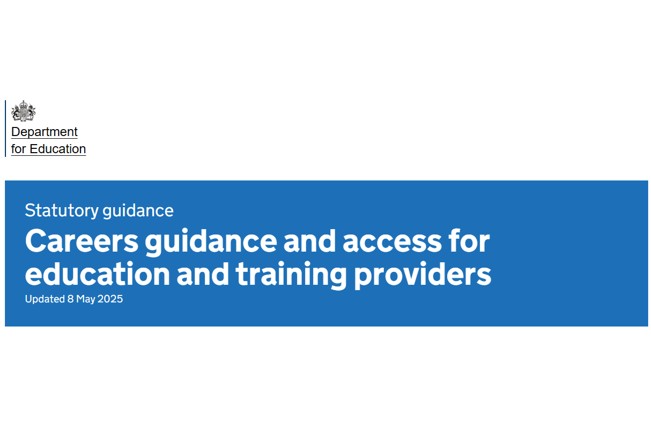

Strengthening professionalism in the updated Statutory Guidance
The Statutory Guidance published by the Department for Education yesterday sets out their expectations of schools, colleges and training providers in England. As expected, it is primarily focused on including the updated Gatsby Benchmarks along with recommendations from the Gatsby ten-year review and introducing the government's new policy on work experience. For a comprehensive review of the updated Guidance,
I would recommend Janet Colledge's sub-stack series of articles, written to explain the guidance for those looking to implement changes. In this article, I will explore the important changes in the Guidance that are related to the recognition of professionalism in career development. It is very encouraging that the new Guidance contains many elements that we have been championing for some time.
Embedding careers advisers
While the role of the careers leader has been prominent in the Gatsby Benchmarks, I have been concerned that work of careers advisers has been seen as too separate from overall careers programmes and focused too much just on the personal guidance interviews (which I am pleased to see are now called 'guidance meetings' - a small but significant change). The Gatsby report signalled a shift towards a more integrated approach to the careers adviser role and that is consistently applied throughout the new Guidance.
As well as being referenced throughout the Guidance, it is made explicit under benchmark 8, stating 'The careers leader and senior leaders should work closely with the careers adviser, enabling them to contribute to the overall development and evaluation of the careers programme. Careers leaders should support careers advisers to integrate their work with other individuals, teams and departments, including the SENCO, subject teachers and pastoral teams'.
While there are examples of fantastic practice, we do hear of schools contracting careers advisers in to hold guidance meetings with little to no connection to the wider team, previous exposure to the young people they are supporting or reference to the wider programme. Embedding careers advisers in the careers programme and encouraging them to work with other staff ensures that the guidance meetings reflect the wider activities of the organisation and bring the careers advisers expertise into the programme design and development.
The value of personal careers guidance
In the introduction to Benchmark 8, the Guidance now includes recognition of the impact personal career guidance can have. It quotes previous research, also highlighted in the CDPG's Investing in Careers report from 2024, stating 'Personal guidance delivered by professional careers advisers breaks down barriers to opportunity for young people. A 2020 study found that for every £1 invested in personal guidance, the government can expect to recoup at least £3. Personal guidance has a positive impact on lifelong earnings and helps to decrease the number of those NEET.'
It also includes a section on what the research suggests works best in providing careers guidance, such as when it is 'conducted by qualified careers advisers who adhere to ethical standards and use up-to-date and evidence-based approaches to ensure successful outcomes for young people'; and is 'integrated with other careers guidance activities and embedded in the institution's comprehensive careers programme'.
Details about personal guidance meetings have been expanded into their own subsection, with additional notes about communicating with learners, parents and carers to raise awareness of the personal guidance offer. And, despite the fears of some that it may be weakened, the reference to the CDI's recommendation for guidance meetings to be a minimum of 45 minutes is retained.
Recognising qualified career development professionals
Critically, the Guidance retains the focus on personal careers guidance needing to be delivered by qualified careers advisers. It still references the career development level 6 and level 7 qualifications, recommending that schools view the Register when recruiting. Plus, they have added a couple of important points; 'Other qualifications may be available from universities that meet the requirements to be on the UK Register of Career Development Professionals.'
The previous guidance listed some of the recognised qualifications but didn't make it clear that other routes are applicable. So I am pleased that by referencing the full list of qualifications applicable for those looking to join the Register, it opens up the options for people to become qualified. 'The careers leader qualifications do not qualify an individual to offer personal guidance unless they also hold a separate careers guidance qualification.'
This reflects growing feedback we have received - that some people who only hold a careers leader qualification (or their employers) think they are able to provide careers guidance. It is very helpful for the government to have made this explicit in the Guidance.
Finally, we know that many of those working in education find it hard to get the time or funding from their organisation to attend or undertake CPD activities. It is crucial to the role of the careers adviser (and careers leader and other careers staff) that they ensure their knowledge is current and continue to develop their skills.
So it is good that the DfE have added 'Schools should encourage and facilitate continuous professional development for careers advisers so that they can remain up to date', which I hope those working in schools can use to encourage their senior team to properly invest in their development.
Positive steps
We never expected this update to the Statutory Guidance to stray far outside reflecting the updated Gatsby benchmarks and introducing the new expectations for work experience, but I have been pleasantly surprised by the many smaller changes that reinforce the commitment to professional careers support for young people. Recognising the need for impartial, informed and qualified career development professionals across all the key roles is hugely important, as well as ensuring a co-ordinated and inclusive approach across these roles.
I would recommend Janet Colledge's sub-stack series of articles, written to explain the guidance for those looking to implement changes. In this article, I will explore the important changes in the Guidance that are related to the recognition of professionalism in career development. It is very encouraging that the new Guidance contains many elements that we have been championing for some time.
Embedding careers advisers
While the role of the careers leader has been prominent in the Gatsby Benchmarks, I have been concerned that work of careers advisers has been seen as too separate from overall careers programmes and focused too much just on the personal guidance interviews (which I am pleased to see are now called 'guidance meetings' - a small but significant change). The Gatsby report signalled a shift towards a more integrated approach to the careers adviser role and that is consistently applied throughout the new Guidance.
As well as being referenced throughout the Guidance, it is made explicit under benchmark 8, stating 'The careers leader and senior leaders should work closely with the careers adviser, enabling them to contribute to the overall development and evaluation of the careers programme. Careers leaders should support careers advisers to integrate their work with other individuals, teams and departments, including the SENCO, subject teachers and pastoral teams'.
While there are examples of fantastic practice, we do hear of schools contracting careers advisers in to hold guidance meetings with little to no connection to the wider team, previous exposure to the young people they are supporting or reference to the wider programme. Embedding careers advisers in the careers programme and encouraging them to work with other staff ensures that the guidance meetings reflect the wider activities of the organisation and bring the careers advisers expertise into the programme design and development.
The value of personal careers guidance
In the introduction to Benchmark 8, the Guidance now includes recognition of the impact personal career guidance can have. It quotes previous research, also highlighted in the CDPG's Investing in Careers report from 2024, stating 'Personal guidance delivered by professional careers advisers breaks down barriers to opportunity for young people. A 2020 study found that for every £1 invested in personal guidance, the government can expect to recoup at least £3. Personal guidance has a positive impact on lifelong earnings and helps to decrease the number of those NEET.'
It also includes a section on what the research suggests works best in providing careers guidance, such as when it is 'conducted by qualified careers advisers who adhere to ethical standards and use up-to-date and evidence-based approaches to ensure successful outcomes for young people'; and is 'integrated with other careers guidance activities and embedded in the institution's comprehensive careers programme'.
Details about personal guidance meetings have been expanded into their own subsection, with additional notes about communicating with learners, parents and carers to raise awareness of the personal guidance offer. And, despite the fears of some that it may be weakened, the reference to the CDI's recommendation for guidance meetings to be a minimum of 45 minutes is retained.
Recognising qualified career development professionals
Critically, the Guidance retains the focus on personal careers guidance needing to be delivered by qualified careers advisers. It still references the career development level 6 and level 7 qualifications, recommending that schools view the Register when recruiting. Plus, they have added a couple of important points; 'Other qualifications may be available from universities that meet the requirements to be on the UK Register of Career Development Professionals.'
The previous guidance listed some of the recognised qualifications but didn't make it clear that other routes are applicable. So I am pleased that by referencing the full list of qualifications applicable for those looking to join the Register, it opens up the options for people to become qualified. 'The careers leader qualifications do not qualify an individual to offer personal guidance unless they also hold a separate careers guidance qualification.'
This reflects growing feedback we have received - that some people who only hold a careers leader qualification (or their employers) think they are able to provide careers guidance. It is very helpful for the government to have made this explicit in the Guidance.
Finally, we know that many of those working in education find it hard to get the time or funding from their organisation to attend or undertake CPD activities. It is crucial to the role of the careers adviser (and careers leader and other careers staff) that they ensure their knowledge is current and continue to develop their skills.
So it is good that the DfE have added 'Schools should encourage and facilitate continuous professional development for careers advisers so that they can remain up to date', which I hope those working in schools can use to encourage their senior team to properly invest in their development.
Positive steps
We never expected this update to the Statutory Guidance to stray far outside reflecting the updated Gatsby benchmarks and introducing the new expectations for work experience, but I have been pleasantly surprised by the many smaller changes that reinforce the commitment to professional careers support for young people. Recognising the need for impartial, informed and qualified career development professionals across all the key roles is hugely important, as well as ensuring a co-ordinated and inclusive approach across these roles.
0 Comments
